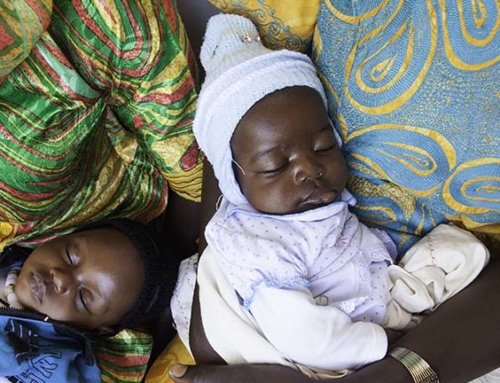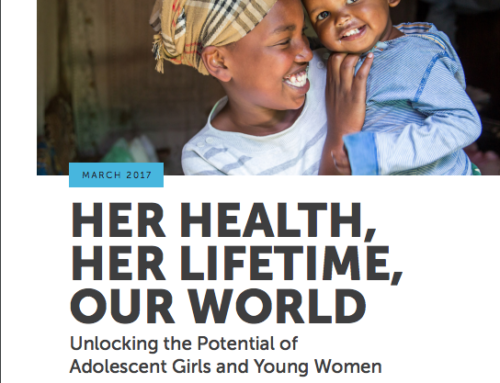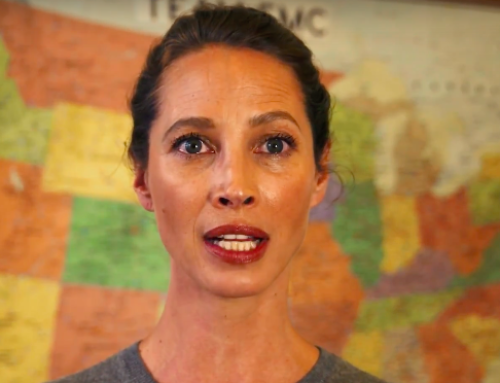[rev_slider alias=”Lunga1″]
Tucked away on a dusty road in the informal settlements
of Eastern Nairobi, you’ll find the Lunga Lunga Youth
Friendly Center. A modest cement building with a
corrugated tin roof, the inside is plastered with
colorful posters promoting free post-rape care and the
importance of protecting yourself from HIV and STIs. It
is managed by U-TENA (Kiswahili for re-uniting), a
grassroots youth organization with a mission of
educating communities about sexual and reproductive
health (SRH).
In September, I traveled with a small delegation from
CSIS to look at reproductive health and family planning
in Kenya, and met with a group of young women at Lunga
Lunga to hear about life in Nairobi’s informal
settlements. We gathered our plastic chairs in a circle,
which grew as more and more women trickled into the
meeting. A number brought their young children, some old
enough to wander around the room, others swaddled in
blankets. The women, mostly in their late teens and
twenties, were well-versed in the language of
empowerment and in the importance of having control over
one’s reproductive health. One young woman explained,
“Family planning worked for me. I wanted to go out and
do something…it sets me free because I can decide how
many kids I have.”
In Kenya, teenage girls have the highest unmet need for family planning among all women of reproductive age and contribute to nearly 1 in 3 maternal deaths.
U-TENA has a variety of programs, from health education
through theater and dance to income generation and life
skills training. The common feature is that all projects
focus on the SRH needs of adolescents, who represent
over a quarter of Kenya’s population. While we heard
that family planning should not just be a woman’s
responsibility, it is clear that young women face
disproportionate challenges. In Kenya, teenage girls
have the highest unmet need for family planning among
all women of reproductive age and contribute to nearly 1
in 3 maternal deaths. Adolescent girls are four times
more likely to contract HIV than their male
counterparts, and nearly half of teenage pregnancies are
unintended.
The women we met with represented a number of different
groups under the U-TENA umbrella, including the Kuza
Project, which focuses on delaying age of sexual debut
through work with older female mentors, and Hope
Creations, which provides income generating
opportunities by teaching women beading and sewing. The
Tupange program, funded by the Bill & Melinda Gates
Foundation, had partnered to provide family planning
information and services and promote SRH through
outreach days. The group outlined several factors that
keep young women from accessing family planning. There
are misconceptions that family planning is for older or
married women, despite that many adolescent girls are
sexually active. Teenage girls do not want to go to the
same health centers as older women, where they feel
judged by public healthcare providers, and turn instead
to private pharmacies, where services are of variable
quality. There are not enough young community health
workers to speak with, and not enough young males
involved in family planning activities. Youth friendly
centers often cater more to boys, who are interested in
hanging out and playing games.
While these challenges are not unique to Kenya’s
informal settlements, they are certainly amplified by a
lack of economic opportunities in the slums. Lunga Lunga
is located near Nairobi’s industrial district, where
many work as day laborers in factories or selling food
on the roadside. Jobs are often hard to come by, which
means that young women rely on boyfriends to buy basic
things, even sanitary pads. Often the men expect sex in
return: “if you’re a single mother making ends meet, an
older man will take advantage of you.” The ensuing
paradox described by one woman is that “most men refuse
family planning, but still don’t want you to get
pregnant.” It is typical for women to hide contraceptive
use from their partners, one factor that has made
injectable contraceptives the method of choice.
Kenya’s recently released National Adolescent Sexual and
Reproductive Health Policy aims to mainstream the SRH
needs of young people into health and development
programming, providing guidance on youth-friendly
services and highlighting the government’s commitment to
providing comprehensive sexuality education. But there
is a wide gap between policy and reality. The failure to
meet the needs of young women in the classroom and
clinic necessitates a more flexible approach, one that
programs like U-TENA work to provide through the
creation of safe spaces, peer groups, and innovative
outreach programs, as well as highlighting the
connections between family planning and economic
empowerment.
If a woman is able to control when she has children and earn a living, it will improve not only her situation, but that of her community as well.
One of the group leaders, Shiko, made it clear that it
is not easy being a single mother. But it was also clear
that she has major ambitions for herself and her son
(“he’s 4 years 8 months and 7 days” she said with a
smile), as she works towards a university diploma in
psychology counseling. She explained that family
planning is key to empowering women, because “in Africa,
when you give birth to a child, the owner is the mom.”
If a woman is able to control when she has children and
earn a living, it will improve not only her situation,
but that of her community as well. The women had hopes
that one day their children would be educated, they
would feel safe walking around at night, and that
poverty would eventually be eliminated from Kenya. And
as they described, at the heart of all these hopes is
family planning.








